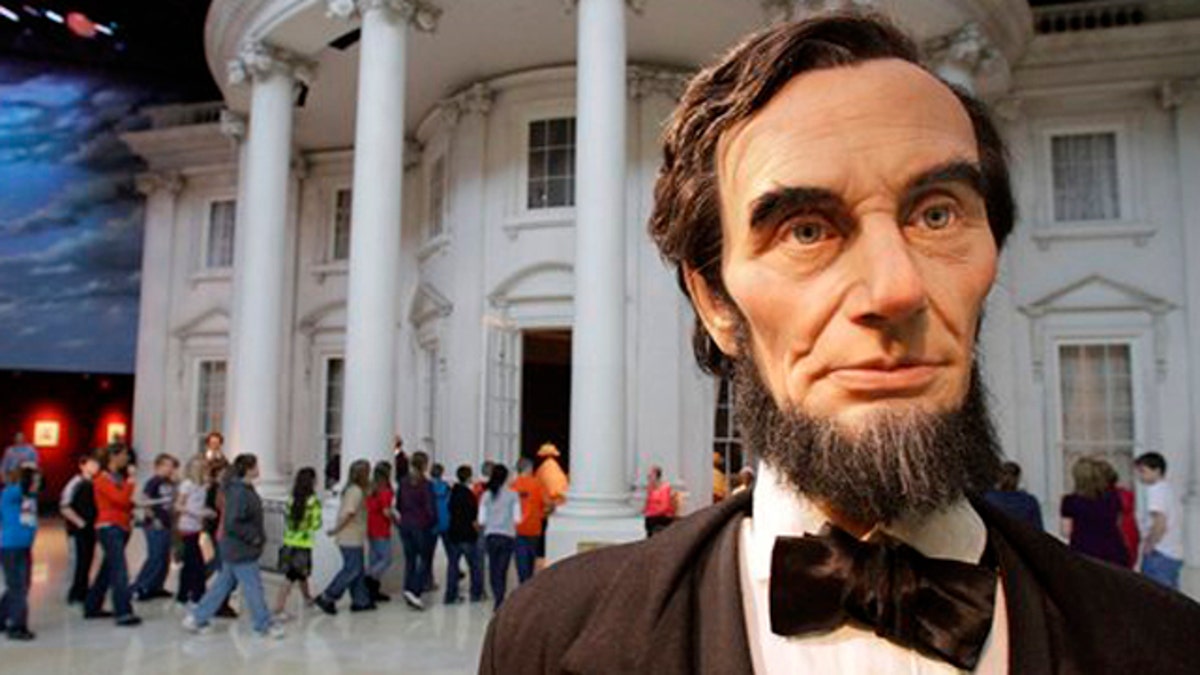
Feb. 10, 2012: School students enter the "White House" as a life size Abraham Lincoln replica stands outside, while touring the Abraham Lincoln Presidential Library and Museum with classmates in Springfield, Ill. (AP)
They were big men. George Washington was 6 feet, 3 inches tall. Abraham Lincoln was almost 6 feet, 4 inches. Their ambitions were equally big -- first for themselves, and then for the nation they would lead.
As young men, both future presidents trained as surveyors during times when Americans were preoccupied by the development of the frontier and the acquisition of land. Historian John Ferling wrote: “Starting around age 15, George learned surveying through self-help books, such as 'The Young Man’s Companion,' and it is probable that he was tutored by some of the surveyors employed by the Fairfaxes.” In his search for self-improvement, 16-year-old Washington famously wrote out the rules for life and behavior from "Rules of Civility & Decent Behavior in Company and Conversation." That pursuit would continue the rest of his life.
Surveying helped define both men. In 1834 Abraham Lincoln was named as a deputy surveyor of Sangamon County in Illinois; George Washington had been appointed as Culpepper County surveyor in 1749. Ferling observed that “surveying...was a respectable and often lucrative occupation in Washington’s Virginia, as the population was growing and new frontiers were opening steadily.”
Still, Washington dreamed of being something more. One Washington scholar noted that Washington decided on a military career because his first occupation, surveying, promised to make him “no more than a gentlemen of the second rank.” Eventually, marriage to a wealthy widow combined with his own financial acumen gave Washington both standing and stability.
As ambitious as Washington was, there were clear limits to what he would do. The Father of the Country eventually was defined by what he did not do as well as by what he did. Washington did not remain in office -- either as general in 1783 or as president in 1797. He thus created the model not only for ambition, but for the resignation of ambition in America.
Abraham Lincoln was also ambitious to rise in life. Born into a hard-scrabble farming family, Lincoln became a surveyor like Washington, a postmaster like Benjamin Franklin, a lawyer like John Adams, a writer like Thomas Jefferson, and a supporter of internal improvements like Alexander Hamilton. For Lincoln, these were rungs on the economic ladder that he was determined to climb.
Years later, Lincoln aide John Hay wrote: “It is absurd to call him a modest man. No great man was ever modest. It was his intellectual arrogance and unconscious assumption of superiority that men like [Salmon P.] Chase and [Charles] Sumner never could forgive.”
From the beginning of Lincoln’s political career in 1832, he acknowledged his own ambition. “I have no [ambition] so great as that of being truly esteemed of my fellow men, by rendering myself worthy of their esteem.”
But there were limits to ambition imposed by Lincoln’s devotion to principle. He concluded his 1858 campaign against Sen. Stephen A. Douglas: “Ambition has been ascribed to me. God knows how sincerely I prayed from the first that this field of ambition might not be opened. I claim no insensibility to political honors; but today could the Missouri restriction [against slavery in the 1820 Missouri Compromise] be restored, and the whole slavery question replaced on the old ground of ‘toleration[’] by necessity where it exists, with unyielding hostility to the spread of it, on principle, I would, in consideration, gladly agree, that Judge Douglas should never be out, and I never in, an office so long as we both or either, live.”
In 1860, Lincoln admitted that the “taste was in my mouth a little” regarding a race for the presidency. The day Lincoln received the Republican nomination for president, he was congratulated by some Springfield residents. “Boys, you had better come and shake hands with me now that you have an opportunity -- for you do not know what influence this nomination may have on me,” he responded. “I am human, you know.”
Lincoln generally was careful not to seem too ambitious. The great Lincoln historian Don E. Fehrenbacher noted that Lincoln’s ambition was “notably free of pettiness, malice and overindulgence. It was moreover, an ambition leavened by moral conviction and a deep faith in the principles upon which the republic had been built.”
Both Lincoln and Washington became exemplars of constructive ambition. During the 1864 presidential campaign, General Carl Schurz wrote that “Lincoln’s name will stand written upon the honor roll of the American Republic next to that of Washington, and there it will remain for all time. The children of those who now disparage him will bless him.”
Lewis E. Lehrman is co-founder of the Gilder Lehrman Institute of American History and
author Lincoln at Peoria: The Turning Point (Stackpole Books, 2008).








































